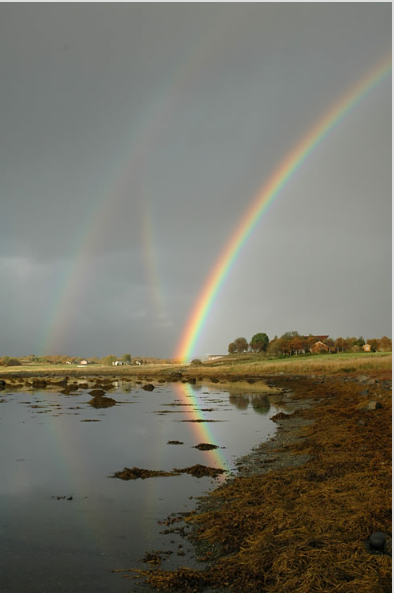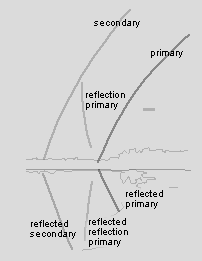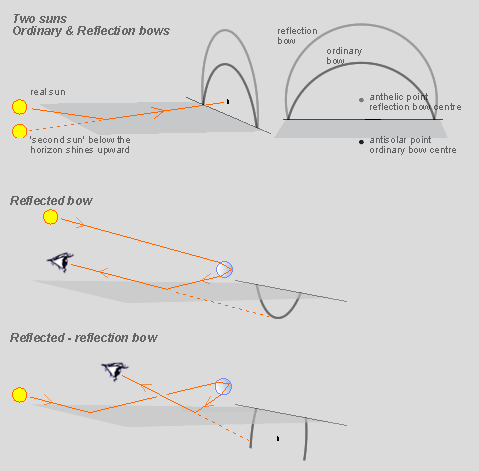Reflection and reflected bows, Norway
Reflection and Reflected Bows: A Captivating Atmospheric Optics Phenomenon in Norway
When it comes to atmospheric optics, nature has a way of mesmerizing us with its enchanting displays. One such spectacle was captured by Terje O. Nordvik in September '04 near Sandessjøen in northern Norway. The scene is filled with bows, creating an extraordinary visual feast for the eyes. Amidst intense rain showers and brief glimpses of a low hanging Sun brightening the moody sky, at least six bows grace the horizon, each with its own unique characteristics and origin.
The Bows in the Sky: A Symphony of Reflections
Among the primary and secondary bows, there is a third bow known as the "reflection" primary. This particular bow is formed when sunlight reflects off the water and travels upwards. To raindrops, this reflected light appears as if it originates from a second sun, positioned the same angular distance below the water's surface as the real sun is above it. This "second sun" gives birth to a rainbow centered on a point in the sky called the "anthelic point." The reflection bow intersects with the ordinary primary at the horizon and gracefully curves above it.
Secondary Bows: Expanding the Realm of Reflection Rainbows
Not only primary bows but also secondary bows can produce reflection rainbows. These secondary bows below the horizon are not true reflections but are formed by raindrops different from the ones that create the sky bows. Rays of sunlight pass through these raindrops and are then reflected by the water's surface, creating an inverted rainbow. The center of this reflection bow rests above the horizon at the anthelic point. At the horizon, where the reflection bow and ordinary bow meet, they form a cusp, adding a touch of mystique to this captivating phenomenon.
Bows in the Water: A Mirror Image of Beauty
The bows that grace the water's surface below the horizon offer a different perspective. These bows are not reflections in the true sense, as they are formed by raindrops distinct from those responsible for the sky bows. Instead, they are created by rays of light that pass through raindrops, reflect off the water's surface, and then travel upwards. This unique path of reflection inverts the rainbow, placing the center of the bow above the horizon at the anthelic point. The reflected-reflection bow is formed by a tortuous ray path, where sunlight reflects off the water, meets raindrops, and bounces back into our eyes, completing the mesmerizing cycle.
A Symphony of Reflection and Reflected Bows
The enchanting display captured by Terje O. Nordvik in Norway showcases the captivating beauty of reflection and reflected bows. Each bow tells its own story, painting the sky and water with vibrant hues. Here are six distinct bows that graced this scene:
- The primary bow in the sky, created by sunlight reflecting off the water's surface.
- The secondary bow in the sky, formed by different raindrops from those responsible for the primary bow.
- The reflection bow intersecting with the ordinary primary at the horizon, curving gracefully above it.
- The reflection bow below the horizon, created by rays of light reflecting off the water's surface after passing through raindrops.
- The ordinary bow below the horizon, formed by raindrops that create a mirror image of beauty.
- The cusp where the reflection bow and ordinary bow meet at the horizon, adding an intriguing element to the spectacle.
In conclusion, atmospheric optics never fails to astound us with its intricate phenomena. The reflection and reflected bows captured in Norway exemplify nature's ability to create breathtaking displays of light and color. Whether in the sky or on the water's surface, each bow adds its own unique touch to the symphony of atmospheric beauty. It is a reminder of the wonders that await us if we take a moment to look up and appreciate the ever-changing canvas of the sky.

Bows everywhere! This extraordinary scene was captured by Terje O. Nordvik in September '04 near Sandessjøen in northern Norway. Image ©Terje O. Nordvik, shown with permission.
"Rather intense rain showers had occurred that afternoon, in between which brief glimpses of a low hanging Sun brightened the moody sky."
There are at least six bows.

The bows in the sky
Between the usual primary and secondary bows is a third bow, a ‘reflection’ primary.
Sunlight reflected off the water and traveling upwards makes the reflection bow. To raindrops, the reflected light appears to come from a second sun the same angular distance below the water as the real sun is above it.
The ‘second sun’ forms a rainbow centered on a point opposite in the sky called the ‘anthelic point’. The reflection bow intersects the ordinary primary at the horizon and curves above it in the sky.
Secondary bows also produce reflection rainbows.
Bows in the water
The bows below the horizon are not reflections in the true sense. They are formed by different raindrops from the ones that formed the sky bows.
Reflected bows are made by rays that are reflected by the water surface after they have passed through raindrops. The reflection inverts the rainbow and the bow centre is then above the horizon at the anthelic point. The reflection bow and ordinary bow meet in a cusp at the horizon.
The reflected - reflection bow below the horizon is formed by a tortuous ray path. Sunlight reflects off the water and travels upwards. It then meets raindrops which form rainbow rays. These reflect again off the water into the eye.
More reflection & reflected bows 1,2,3,4,5,6

Note: this article has been automatically converted from the old site and may not appear as intended. You can find the original article here.
Reference Atmospheric Optics
If you use any of the definitions, information, or data presented on Atmospheric Optics, please copy the link or reference below to properly credit us as the reference source. Thank you!
-
<a href="https://atoptics.co.uk/blog/reflection-and-reflected-bows-norway/">Reflection and reflected bows, Norway</a>
-
"Reflection and reflected bows, Norway". Atmospheric Optics. Accessed on December 24, 2024. https://atoptics.co.uk/blog/reflection-and-reflected-bows-norway/.
-
"Reflection and reflected bows, Norway". Atmospheric Optics, https://atoptics.co.uk/blog/reflection-and-reflected-bows-norway/. Accessed 24 December, 2024
-
Reflection and reflected bows, Norway. Atmospheric Optics. Retrieved from https://atoptics.co.uk/blog/reflection-and-reflected-bows-norway/.